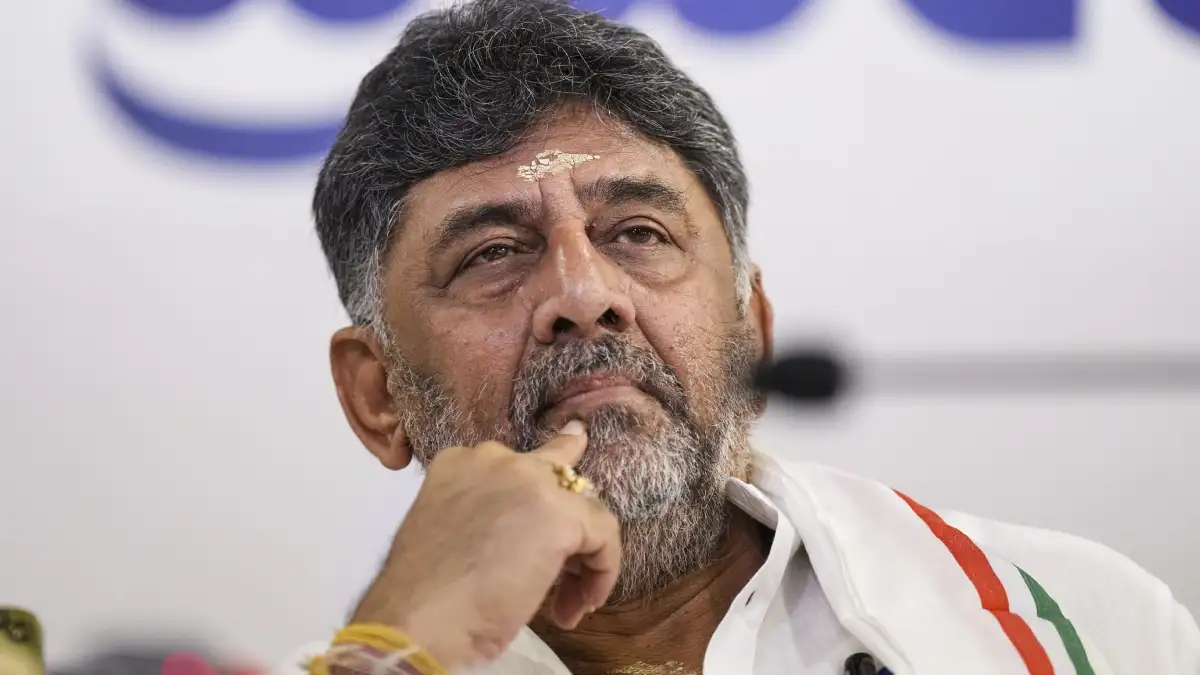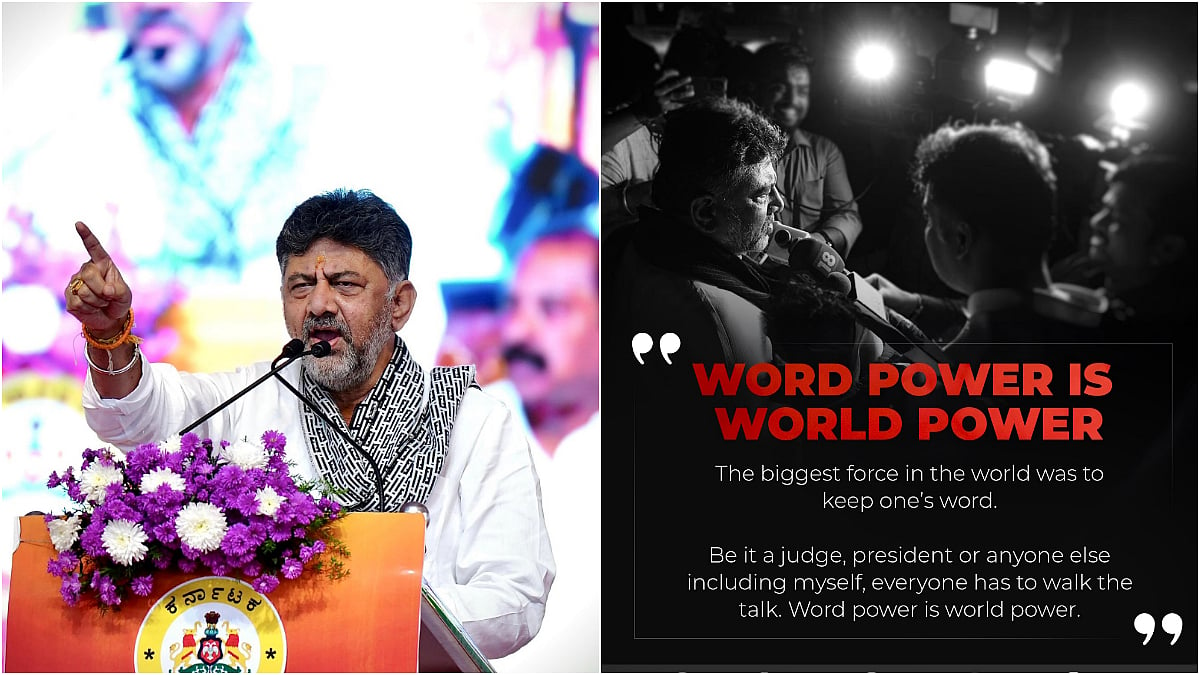A cryptic social-media post by the Deputy Chief Minister of Karnataka, D.K. Shivakumar, declaring “Word power is world power,” has triggered fresh speculation about internal power dynamics within the state’s ruling party. Posted amid simmering tension over the future of the Chief Minister’s post, the message appears to rekindle debate over a rumored leadership transition. Political observers now view Shivakumar’s words as a pointed reminder to party insiders — and perhaps a warning that commitments must be honoured. The timing of the post, just days after the government completed half its term, suggests that the push for clarity on leadership may be intensifying.
While Shivakumar later denied having authored the post — calling it “fake” — the message remains visible on his feed, keeping the speculation alive. Several senior leaders within the party and loyalists have begun interpreting the phrase as a subtle assertion over the coveted top post, believed to be due for rotation based on an alleged agreement. With the state’s political environment already under strain from the tug-of-war, the post has stoked public interest, media scrutiny, and internal uncertainty over who will steer Karnataka’s government in the next phase.
A Veiled Message or a Direct Challenge? What Shivakumar’s Post Means
In the post, Shivakumar shared a black-and-white photograph of himself, accompanied by the quote: “Keeping one’s word is greatest strength in the world! Word power is world power. The biggest force in the world was to keep one’s word… everyone has to walk the talk.” Many interpret this as a veiled reference to a past understanding within his party about leadership rotation — an understanding that, according to his supporters, promised him the top seat after two-and-a-half years in office. That deadline has reportedly been crossed, reviving hope among his camp that the agreement will now be honoured.
Immediately after the post, the state’s political climate became tense. Rumours swirled that Shivakumar held late-night meetings with allied ministers and faction leaders, suggesting attempts to gauge support for a possible leadership change. Some MLAs from his camp reportedly flew to Delhi to press their demand before the party high command. The message — though cryptic — is being treated as more than words; it is being seen as a strategic move to shape opinion within the party and among the public.
Importantly, even as speculation heightens, Shivakumar’s denial has added layers of ambiguity. When questioned, he reportedly said the viral post was “fake” and that he had not posted it. Nevertheless, the post continues to draw eyeballs, making it unclear whether it was a drafting error, an unauthorized edit, or a deliberate political statement. Either way, the message has done its job — it has drawn attention, provoked conversation, and forced stakeholders to respond.
Despite this public confusion, sources within the party say talks are underway to placate both camps. High-level meetings with central leadership have been reportedly scheduled to address the issue directly and prevent internal discord from turning into a full-blown crisis. The message from party insiders is that while ambition is natural, the official stance will depend on consensus — and the high command will ultimately decide the matter.
Power Struggle Unfolds: What the State’s Top Leadership Says
Not long after Shivakumar’s post, the state’s Chief Minister, Siddaramaiah, responded — not with anger, but with what analysts call a rhetorical counterpunch. He posted on social media that “a word is not power unless it betters the world for the people,” emphasising that his commitment is to public welfare, not political deals. He underscored that the mandate given by voters was for a full five-year term, and asserted that governance should focus on delivering public welfare rather than chair-related calculations.
Siddaramaiah pointed to implementation of social-welfare guarantee schemes and infrastructure promises fulfilled so far, arguing that governance is about delivery, not deals. With electoral prospects for the ruling party and public interest at stake, he conveyed that holding onto office is not a matter of ego but of continued administrative responsibility. His post appeared to be designed to reaffirm his legitimacy while subtly rebutting suggestions of an internal agreement involving power rotation.
The rapid exchange of cryptic verdicts between the two top leaders has sent ripples across Karnataka’s political fabric, stirring speculation, fueling media debate, and capturing public attention. While Congress top brass and state leaders call for calm and collective decision-making, grassroots activists, opposition parties and media houses treat the incident as evidence of brewing internal conflict — one that could reshape the political narrative in Karnataka for years to come.
Political Fallout: Internal Factions, Public Perception, and Opposition Gains
The fallout from the post has extended beyond party corridors into public discourse. Among local politicians, there is visible unease over the optics of disunity, especially with upcoming elections on the horizon. Some senior leaders, worried about dissent, have tried to downplay the issue, urging both sides to avoid “public spectacle.” Others — particularly those aligned with Shivakumar — view the post as a long-overdue nudge to honour past promises. This divide is prompting jockeying for position, with some leaders reportedly repositioning themselves in anticipation of possible reshuffles.
For opposition parties, this has been an opportunity to raise questions about the ruling party’s stability. They argue that such tussles distract from governance and policy delivery, pointing out delays in welfare schemes, unmet public commitments, and administrative inertia. In media commentary, some analysts warn that the power struggle could deepen rural–urban divides, regional fault lines, and caste-based politics — if not managed carefully. The public mood appears mixed: while many citizens express frustration over political infighting, some see this as the first step toward accountability and transparency within the party.
At grass-roots level, local Congress workers in several districts have reportedly expressed confusion and concern over shifting loyalties. In some regions, supporters of Shivakumar have demanded clarity and assertiveness, while workers close to Siddaramaiah have sought reassurance that governance and implementation will not be affected. The uncertainty has already disrupted party activities in a few constituencies, and morale appears fragile. For a party that won strongly two years ago, the internal rift risks eroding organizational cohesion just months before crucial electoral tests.
Meanwhile, the rival Bharatiya Janata Party (BJP) has seized the opportunity to highlight what it calls “Congress chaos.” Party spokespersons and media cells have amplified the narrative that Congress is consumed by internal ambition, neglecting public issues such as inflation, infrastructure neglect, and law-and-order problems. In public rallies and social media posts, the BJP has used Shivakumar’s message to question the credibility of the government and demand early polls, arguing that the people’s mandate is being undermined by internal political games.

What Happens Next — High Command, Compromise or Crisis?
As the dust settles from public exchanges, all eyes are now on the central leadership of the Congress party. Observers expect a high-profile meeting in New Delhi involving senior leaders, including national party heads, to try and defuse the tension. The objective is likely to be a negotiated settlement that preserves party unity, ensures continuation of welfare governance, and prevents electoral damage. The high command is under pressure to act fast — prolonged uncertainty could deepen factionalism, erode public confidence, and open the door for rival parties to exploit the instability.
Possible outcomes include reaffirming the current leadership till the end of the term, announcing a formal rotational agreement, or reshuffling the cabinet to accommodate both camps without compromising stability. Some suggest the party may also attempt to formalize internal power-sharing through documented agreements to avoid ambiguity later, though rivals warn this could further complicate internal dynamics by inviting more claimants. For now, party insiders stress the importance of consensus, communication, and avoiding public conflicts.
In the public sphere, politicians, analysts and citizens alike are watching closely. The post-by-post verbal sparring may soon take on more concrete dimensions — resignations, loyalty shifts, or formal public demands. Observers caution that if the dispute escalates beyond symbolic gestures, it could disrupt governance, stall schemes, and delay development initiatives at a time when the state faces economic and social challenges. The coming weeks could determine not just who leads, but how stable governance will be maintained in Karnataka.
Conclusion: When Words Become Weapons in Political Chess
D.K. Shivakumar’s terse declaration “Word power is world power” may appear simple, yet in Karnataka’s charged political context, it has transformed into a loaded statement — one that threatens to unsettle existing power structures. It underscores how in politics, language can carry weight far beyond grammar — evoking expectations, stirring anxieties, and igniting power plays. As the state’s leadership tussle unfolds under public gaze, the true impact of that one phrase may determine not just who sits at the helm, but the direction Karnataka takes in the coming years.
For now, Shivakumar’s post stands as a symbol of ambition, impatience, and demand for accountability. The contrasting response by Siddaramaiah emphasises that governance and fulfilment of public trust matter more than private deals. The Congress high command faces a critical test — to balance internal ambition, public expectations, and electoral considerations without letting “word play” overshadow real work.
Follow: Karnataka Government
Also read: Home | Channel 6 Network – Latest News, Breaking Updates: Politics, Business, Tech & More


